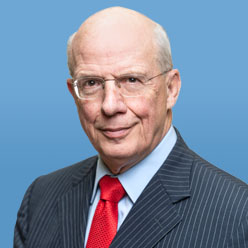The American Foreign Policy Council traveled to Prague, Czechoslovakia this past July to co-sponsor the “Peaceful Road to Democracy” conference. The three day event was initiated at the request of President Vaclav Havel, in coordination with his group, Charter 77, and was directed by the American Foundation for Resistance International.
Jointly co-sponsored by the American Foreign Policy Council and the National Council to Support the Democracy Movements, the Prague conference was instrumental in bringing together representatives of the pro-democracy movements, al recently exiled leaders, who now make their home in the West. Their activity stems from a conference held in Paris in May 1989, where the delegates signed a charter containing the principles of self-determination, a free market economy, and non-violent methods.
The formal conference began with the gathering of the delegates in Wenceslaus Square to honor Jan Palach, the young man who set himself on fire at that spot in 1968, martyring himself as the Soviet tanks rolled in to put down the growing rebellion against Soviet authority. It was a conference upon which the significance of Palach’s actions would not be wasted. From the beginning to the last speech, the voices of those who had suffered under a totalitarian regime were heard. Over and over they thundered, socialism cannot be reformed or restructured, it can only be eliminated.
Held in the Culture Palace in Prague, the issues for the conference began as broad assessments of totalitarian regimes everywhere, and culminated in a detailed statement of purpose, known as The Prague Appeal. The statement outlines their concerted appeal to the “public and the governments of the West not to support Gorbachev and his perestroika, which is pushing the country to the brink of destruction”. President Havel said, “When human rights are threatened anywhere, human rights are threatened everywhere”. These words are not likely to be forgotten by the delegates assembled.
Through this valuable interface with Western opinion makers and with each other, the delegates from the Soviet republics received an exposure to the ideas of democracy and religious freedom they previously had only dreamed about.
